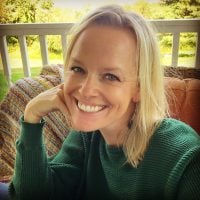
I sat at the edge of my mother’s bed while she lay curled up in the dimly lit room.
Tears were gently rolling down her face as she voiced her fears, her sadness, and her deep anguish.
I don’t remember the words I said to her to soothe her aching heart. I only remember the feelings I had. Calm, gentle, and flowing through me like they had been waiting for their cue to be expressed. It was their turn to be heard and it took no effort on my part to access them.
“How do you always know what to say?” My mother asked me.
“I don’t,” I replied. “I just feel it. It’s God’s voice speaking through me.”
“How do you know?” She questioned with hopeful curiosity.
“I don’t know how. I just do. How do you not?” I asked, equally curious.
I was eight years old.
The truth is I didn’t know. I was raised with traditional Christian teachings and didn’t know if it was “God,” but those words of comfort didn’t feel like mine alone. They were words of hope, solace, and a knowing faith that seemed to move through me as quickly as they were summoned.
My quiet knowing always seemed to know what to say. At my mother’s lowest moments, they became even louder when she and I needed them most.
My mother struggled with manic highs and debilitating lows for the entirety of my childhood. Her first month-long hospitalization for emotional and mental instability occurred when I was nine months old.
From my infancy until her death by suicide 14 years later, I had only known her in her quest for solace from an internally chaotic life. I had used my voice of knowing as often as I could to offer her any semblance of peace. As a child, my own needs depended on it.
After her death, my trust in that voice was compromised. I didn’t know who “God” was anymore, and I no longer knew what I believed.
I did not hear a quiet companion of hope but a wavering optimist. The soft knowing I once was comforted by felt replaced by the cries of confusion and loneliness. The only knowing I felt sure of was not wanting to feel that much hurt again.
I began to overthink my decisions and felt overwhelmed when I didn’t have a clear view of the repercussions that would follow.
Trauma theories suggest my voice of knowing had more static interference, as I was retriggered over and over again when experiencing people I love in pain, including myself. To guard myself from injury, my fear voice, my protective voice, became louder than my faith.
It makes sense.
When I look back on the major choices from my adolescence through early adulthood, I can see how logic and often the fear in my head won out over the tender knowing of my heart.
The “safe” college I went to, the friendships that didn’t serve my well-being, the relationships I gripped on to well passed their expiration dates. The jobs I despised, the fear that I’d never have enough or be enough. The countless times I said yes when I really wanted to say no or vice versa. And trying to maintain the image of following through with what the “right” choices were so that I’d be accepted and not left behind. Yet never knowing what was “right” for me.
The more experiences we have, the pain we feel and the skepticism conforms us and the softer our knowing voice becomes. Not mute, but quiet. So quiet that it’s hard to hear when fear is the loudest voice in the room.
My own disconnect and distrust of this voice is also what led me to study how to reconnect with her: that little girl, that knowing, and the strong faith in her ability to cut through the noise and hear her truest wisdom.
In my quest, I have studied varied ways to connect with this voice through science-based techniques and spiritual traditions and practices. I’ve experimented with countless neurosensory exercises to regulate my nervous system and dove deep into energy medicine to grasp the flow of our energy systems. They all work. They all have merit, and they all have one common goal: to feel good, balanced, whole, and fulfilled in whatever ways we can.
To be clear, I don’t think the goal is to abolish our fear. In order to live this life fully, we need both. We need our natural protectors to look both ways before we cross the street, just not 245 times and still never cross.
One of my favorite practices to connect with the knowing voice when making a decision or crossing the road is to ask myself this: “If I took the fear out, what would I do?”
This not only helps to identify the fear but to also notice which voice has been trying to make the decision. The voice of knowing is generally calm and without fanfare. The voice of fear is that which will sound the alarms when we threaten to change the status quo.
Taking out the fear when making a decision does not take out the fear when we take action on that decision. But, it is an amazing practice to tune into which voice is trying to take the lead. We can let it be the one that will be needed over and over again as we keep moving forward in new territories with unknown outcomes. The one we can fall back on when the inevitable crossroads meets us again.
What is your relationship with your intuitive voice, your gentle knowing?
What times in life did you feel most connected to it?
What moments did you feel it went silent?
How easily do you trust its guidance?
What would you do if you took the fear out?
Which way would you go?
~
Please consider Boosting our authors’ articles in their first week to help them win Elephant’s Ecosystem so they can get paid and write more.
~

 Share on bsky
Share on bsky




Read 6 comments and reply